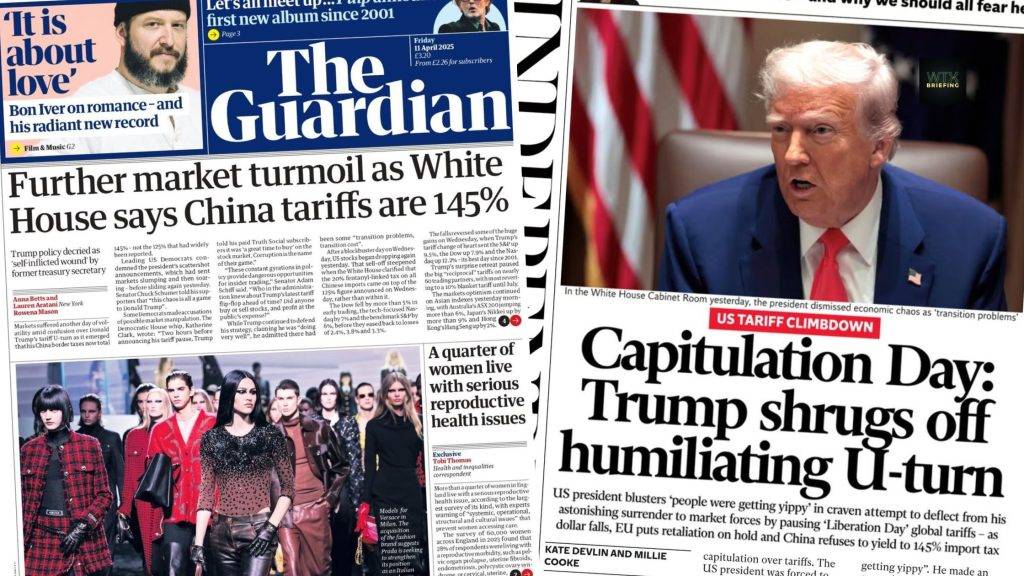The further market turmoil from the Trump tariffs, the stock market reaction and now claims of potential insider trading dominate much of the global news this morning.
Gold has risen to a record high as investors seek safe-haven assets amid the chaos. The ongoing escalation in the US-China trade war is still causing chaos in the markets as the Asian markets slid on Friday and the US markets slumped on Thursday close, wiping out a chunk of Wednesday’s historic rally. The US markets open at 14:30 GMT.
The UK and other main European markets have opened positively on Friday morning.
On Thursday, the White House confirmed that China faced a tariff rate of 145% – which includes the pre-existing 20% levy over fentanyl coming into the US. Beijing had earlier on Thursday announced an 84% tariff on US goods entering the country and has made it clear they won’t back down from this US-made trade war.
Further market turmoil from Trump tariffs






Further market turmoil as White House says China tariffs are 145%
Explainer: The headline uses the phrase “further market turmoil” to exaggerate the severity of the situation, suggesting ongoing instability. The claim that “China tariffs are 145%” is presented as a shocking figure, aimed at increasing alarm. The language focuses on creating fear and urgency around economic tensions.
- The Guardian describes it as “further market turmoil” after the US confirmed a tariff rate of 145% on some products. The paper reports on criticism from Democrats of Trump’s “scattershot announcements” and says a former treasury secretary has branded the president’s policy a “self-inflicted wound.”
Markets fall as Trump admits to ‘transition problems‘
Explainer: The headline links “Markets fall” directly to “Trump admits to ‘transition problems'”, implying his words caused the market decline. The use of “transition problems” in quotes adds drama, suggesting controversy or instability. The phrasing heightens the impact by oversimplifying the situation.
- The Daily Telegraph reports that the imposed tariff rate on China of 145pc as markets fall again. The paper says losses on Wall Street accelerated after the news, with the S&P 500 down today by 4.9pc. The Nasdaq fell 5.7pc, and the Dow Jones dropped 5pc. The dollar fell sharply and is now currently down 1.8pc against a basket of other leading currencies. It is down 0.8pc against the pound.
US deal will not lessen 10% tariffs, Britain told.
Explainer: The headline uses “will not lessen” to emphasise a sense of disappointment or failure in the deal. The phrase “Britain told” implies an authoritative, possibly unwelcome message. The subheading, “Focus now on protecting cars from higher levy”, introduces a new concern, heightening the sense of urgency and adding potential economic threat, suggesting ongoing challenges.
- The Times says government ministers are not optimistic about Britain securing an exemption from the US tariffs. The paper says the best-case scenario would be a continuation of the baseline 10% levy on UK goods being imported into the US.
UK moves closer to softer Brexit as hopes fade for quick US deal
Explainer: The headline uses “moves closer” to suggest progress, but the phrase “softer Brexit” implies a shift away from what the UK voted for when they voted to leave the European Union. The second part, “as hopes fade for quick US deal”, tells the reader why the UK needs to work closer with the EU – and why a hard Brexit approach doesn’t work in the current climate.
- The i newspaper also reports that hope is fading for a UK-US deal, with the UK moving “closer to softer Brexit” instead. The UK is preparing to “strike a defence pact” with the EU, it reports.
Brussels open to taxing Big Tech if Trump talks fail, von der Leyen says
Explainer: The headline uses “open to taxing” to suggest that Brussels is willing to take action, creating a sense of readiness for confrontation. The phrase “if Trump talks fail” adds conditional uncertainty, implying that failure in negotiations could lead to significant economic consequences.
- The FT says the EU is prepared to deploy its most powerful trade measures and may impose levies on US digital companies if negotiations with Donald Trump fail to end his tariff war against Europe.
China AI campaign after Trump trade blow
Explainer: The headline uses “AI CAMPAIGN” to suggest an active and strategic effort, possibly implying an aggressive move by China. The phrase “AFTER TRUMP TRADE BLOW” ties China’s actions directly to a negative development in the US, using “BLOW” to hype up the impact of the trade setback. This creates a sense of retaliation or response, heightening the drama and tension between the two countries.
- Metro has a lighter angle – the paper says China has “unleashed a series of memes mocking Donald Trump’s trade war.” One of the memes is splashed on the front page – a fake image of Trump, JD Vance and Elon Musk working at a shoe factory.
PM vows to ‘turbocharge‘ economy in face of US tariffs
Explainer: The headline uses “vows” to convey determination, implying strong leadership in response to challenges. The word “turbocharge” adds a sense of urgency and boldness, suggesting dramatic action. “In face of US tariffs” frames the situation as a direct challenge, heightening the stakes and making the economy’s response seem even more critical.
- The Scotsman says the prime minister has vowed to turbocharge the UK economy in the face of US tariffs. The PM says “We have to take care of ourselves,” as he warns the public the levies are here to stay.


